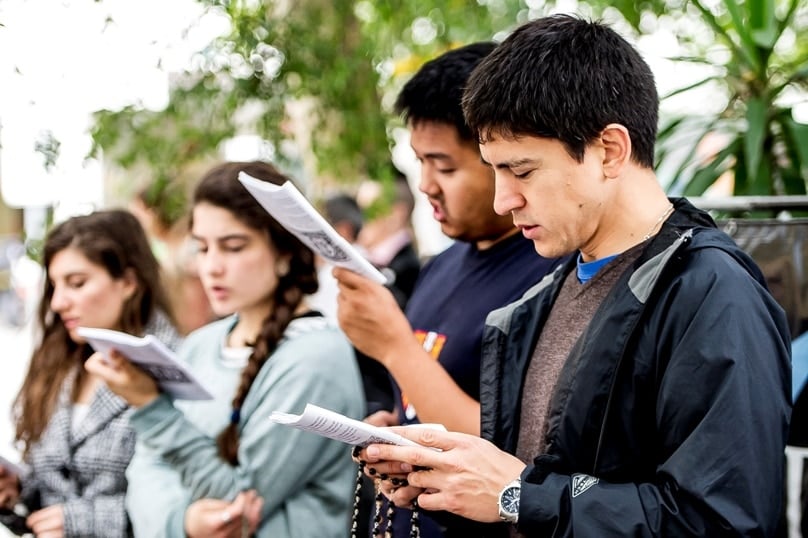
“Police were called to the clinic after reports a man was praying outside.” Unfortunately, this sentence is not satire, but a quotation from a real article in The Age newspaper last week.
The clinic in reference was an East Melbourne abortion clinic, where the Helpers of God’s Precious Infants have kept prayerful vigil for more than 20 years. But new laws which were passed last year and came into force last week criminalise even this type of prayerful presence from being within 150 metres of an abortion clinic.
And on the first day of the new laws, clinic staff were ready to ensure the laws were enforced.
The rhetoric which led to the laws being introduced in Melbourne was that those keeping vigil were harassing women seeking an abortion.
The article from The Age explained that “a bill introduced by Sex Party MP Fiona Patten last year made it illegal for anti-abortion protesters to harass or film people coming or going from abortion clinics, with heavy penalties for those who break the law”.
But that’s actually not true, because harassment or filming of a person going to and from an abortion clinic – or to and from anywhere – was already illegal.
Section 21A of the Crimes Act 1958 (Vic) already prohibited using abusive or offensive words, performing abusive or offensive acts, giving offensive material or leaving it where it will be found, keeping a person under surveillance or acting in any other way that could reasonably be expected to cause physical or mental harm, including self-harm to a person.
Police were called several times each week by clinic staff wanting the vigil-keepers gone, but their behaviour could never be seen as being on the wrong side of even such a broad law. The difference with the new law is that it is not about criminalising actions, but opinions.
Anyone who opposes abortion, however peacefully, is a criminal.
A simultaneous crackdown on prayer is occurring around the country.
In Canberra, similar “exclusion zone” laws came into force last month. The archdiocese of Canberra-Goulburn’s Catholic Voice newspaper reported that eight participants in a peaceful and prayerful vigil received an official police warning and were asked to move on, putting an end to a vigil which has been kept on the same Canberra street for 17 years.
A 75-year-old man did not move on after being asked. He told police that a law prohibiting protests did not apply to his behaviour, because he was not protesting but praying. A protest, he said, was directed at other persons while prayer was directed at God.
He was fined $750 (for praying a rosary).
And now a campaign has begun to have these thought-policing laws passed in NSW. Last week, Labor MLC Penny Sharpe announced that she will be introducing a private member’s bill for similar laws in NSW.
Ms Sharpe told media that “women trying to access a reproductive health service should not have to run the gauntlet of people who are seeking to stop them with physical harassment, graphic images and verbal abuse”.
But, as in Victoria, the type of behaviour which Ms Sharpe is using to justify the imposition of an exclusion zone around abortion clinics is already prohibited under the law.
Section 545B of the Crimes Act 1900 (NSW) makes it a crime to use violence or intimidation to compel a person to abstain from undertaking a lawful activity (and abortion enjoys at least a quasi-legal status in NSW).
Ms Sharpe gave an interview about the proposed laws on ABC Radio the day she announced her intentions.
I phoned the program to participate in the talkback component. “What would you like to say?” the lady operating the switchboard asked me.
I told her that I wanted to ask Ms Sharpe what behaviour which wasn’t already covered in section 545B of the Crimes Act she was trying to address. I said that I wanted to suggest to Ms Sharpe that if she believed a prohibition on intimidation was not broad enough to protect people from being harassed, then the appropriate response would be to amend the Crimes Act to make sure that bad behaviour is illegal in any circumstance, and not just around abortion clinics. I said that I wanted to ask her whether she really thought the law did not sufficiently protect people against physical harassment and verbal abuse, or was it more likely that she was seeking to criminalise opposition to abortion. I wanted her to be honest about the proposal, and to stop pretending that it had anything to do with the safety of women.
Unsurprisingly, my question was not chosen to be posed to Ms Sharpe.
But that’s OK, because there will be many more opportunities to ask these questions of her and our other parliamentary representatives as the debate continues. I hope to keep you updated on progress, and on ways you might like to make your voice heard, too.
